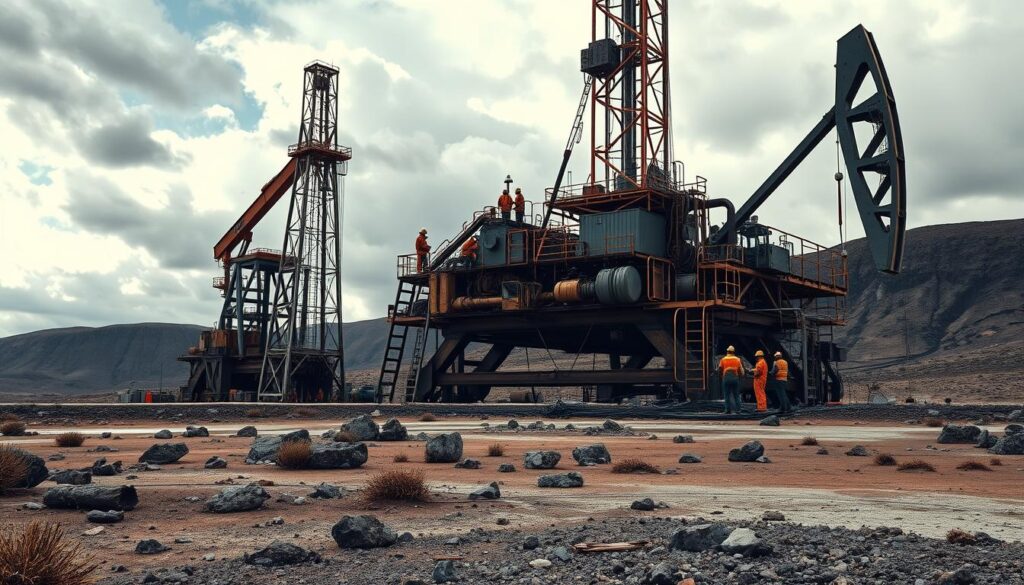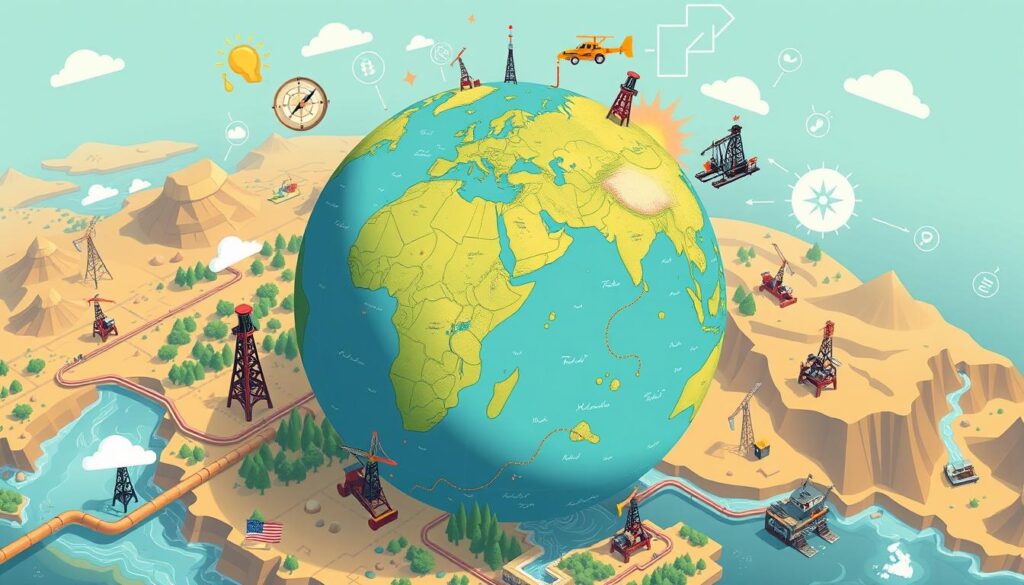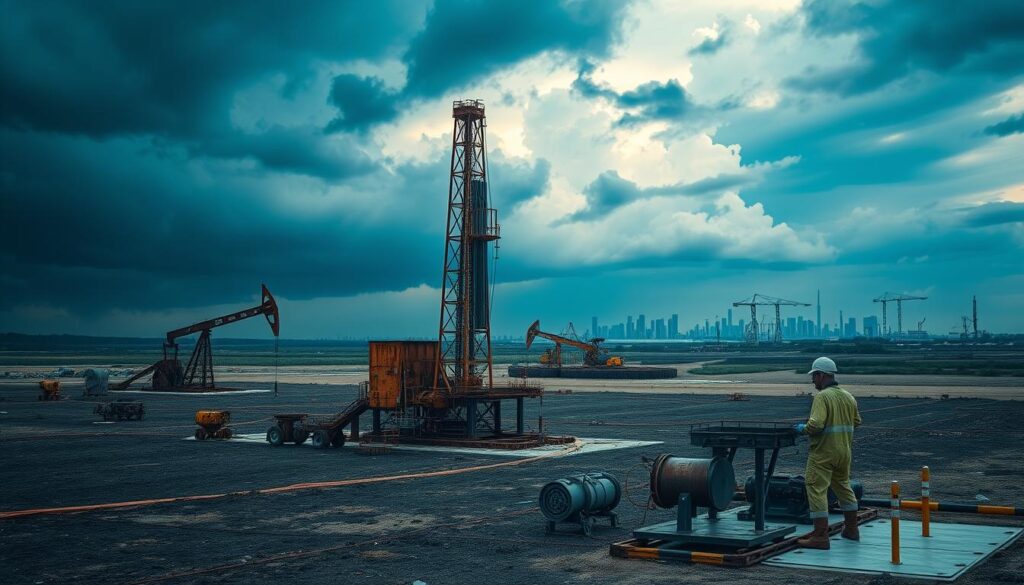Working as a petroleum engineer might look exciting at first. But, the real deal is much harder. This job needs you to be very strong, know a lot about tech, and give up a lot personally.
Think about working for weeks on a remote platform. You’ll face bad weather and be far from your family. The tough parts of this job go beyond just the hard work. You’ll deal with big decisions, worry about the environment, and face changes in the industry all the time.
So, what’s wrong with being a petroleum engineer? It pays well but takes a lot from your personal life, job security, and freedom to choose your work. This job is not just about digging and getting oil. It’s about dealing with a tough and changing industry.
Key Takeaways
- Extreme work environments with significant personal sacrifices
- High-stress job with constant industry volatility
- Limited geographic flexibility and frequent relocations
- Physical and mental challenges in remote work settings
- Complex ethical considerations regarding environmental impact
- Potential career limitations due to industry fluctuations
Understanding the Role of Petroleum Engineers in Today’s Industry
As a petroleum engineer, you are key in the energy world. You face tough challenges and bring new ideas to oil and gas. Your job mixes tech, engineering, and managing resources, needing both skills and strategy.
Being a petroleum engineer is more than just finding oil. You find oil spots, plan how to get it out, and find new ways to do it better. This job is always changing, so you must keep learning.
Core Responsibilities and Daily Tasks
Your day is filled with leading drilling teams, studying earth data, and using new ways to get oil. You must always find new solutions to problems. The job is risky, so safety and caring for the earth are very important.
Industry Position and Market Demands
The world of petroleum engineering is always changing and competitive. With a 8% job growth and over 2,000 jobs each year, there are many chances. You can earn up to $130,850 a year, making it a top engineering job. Being adaptable is key in this fast-paced market.
Required Skills and Qualifications
| Skill Category | Percentage |
|---|---|
| Reservoir Characterization | 15.4% |
| Engineering Support | 12.0% |
| Business Development | 10.2% |
| Technical Specializations | 59.4% |
To succeed in petroleum engineering, you need to know a lot about tech, earth science, and business. Mixing your tech smarts with strategic thinking will shape your career in this exciting field.
High-Risk Job Security in the Oil and Gas Sector
Thinking about a career in petroleum engineering? You’ll find job security is as shaky as oil prices. The field’s ups and downs make it hard to keep a steady job.
Numbers show job instability is real. In 2020, about 70% of oil and gas jobs were cut. People in this field usually stay in their jobs for only 3-5 years. This is much shorter than many other jobs.
Job satisfaction can drop because of these changes. Oil prices can swing by 25% each year. This makes jobs uncertain. A survey found 60% of workers worry about losing their jobs because of price changes.
It’s smart to save money in this field. Experts say you should have enough saved to last during job losses. The bad side of petroleum engineering is that up to 40% of jobs can be cut during tough times.
| Industry Metric | Impact on Job Security |
|---|---|
| Average Job Tenure | 3-5 years |
| Potential Layoff Percentage | 20-40% |
| Recovery Period | 2-3 years |
To do well in this tough field, you need to be strong and flexible. Networking, learning new skills, and keeping your finances in order are important. These steps help you get through the ups and downs of petroleum engineering.
Challenging Work-Life Balance and Demanding Schedules
Petroleum engineering is tough for those wanting a good work-life balance. It has very long hours that go beyond regular work. If you’re thinking about this career, knowing the stress is key.
People in this field often work way more than 40 hours a week. Almost 60% say it’s hard to keep up with personal stuff because of work. Schools for petroleum engineering try to get students ready for this, but it’s hard to handle every day.
Long Working Hours and Rotating Shifts
Petroleum engineers usually work 50-60 hours a week. Their schedules can be very unpredictable. They might work long hours or be away from home for weeks.
| Work Schedule Characteristic | Impact on Professional Life |
|---|---|
| Average Weekly Hours | 50-60 hours |
| Remote Work Frequency | High (multiple weeks per assignment) |
| Travel Requirements | Frequent and often short-notice |
Impact on Personal and Family Life
The long hours at top petroleum engineering schools are like the real world. You’ll have to balance work and family. The commute can be over an hour each way, making it hard to manage time.
On-Call Requirements and Emergency Response
Being ready for emergencies is a big part of petroleum engineering. You might have to be on call 24/7. This adds to the stress and requires being very flexible.
Even with these challenges, many find the job rewarding. There are more wellness programs and flexible hours now. This gives hope for better work-life balance in the future.
Remote and Harsh Working Environments

As a petroleum engineer, your work is not like a regular office job. You’ll face challenges in remote places that test your body and mind. Schools for petroleum engineering teach about these tough spots, but it’s different when you’re there.
You might work in places like hot deserts or cold arctic areas. These jobs mean being away from home for long periods. You’ll live in small spaces with little privacy. The loneliness can be hard on your mind.
| Work Environment | Typical Challenges | Potential Impact |
|---|---|---|
| Desert Locations | Extreme heat | Dehydration, heat exhaustion |
| Arctic Regions | Freezing temperatures | Increased risk of hypothermia |
| Offshore Platforms | Isolation, limited communication | Mental health challenges |
Workers in remote oil and gas areas face a lot of stress. They can be isolated for weeks or even a year. This can lead to anxiety and depression.
While some might find the adventure exciting, petroleum engineers need strong ways to cope. It’s important to stay in touch with family, stay active, and take care of your mental health. These skills are key to surviving in tough work places.
Physical Demands and Safety Concerns
Being a petroleum engineer is tough. You face challenges that most engineers don’t. It’s not just office work. It’s about facing physical and safety risks.
You need to be very strong physically. Engineers work in extreme places. Places like hot deserts and cold offshore sites.
They stand for long hours. They lift heavy things. And they stay alert in dangerous places.
Safety Risks in the Field
Safety is key in petroleum engineering. The job is full of dangers. There are 208 active offshore drilling units worldwide.
You must follow strict safety rules. You handle dangerous substances. And you must act fast in emergencies.
Environmental Impact Considerations
Working in petroleum engineering means facing environmental issues. Your job affects nature. You must find a balance between getting resources and protecting the environment.
Techniques like water and chemical injection are used. But they need careful handling to avoid harming the environment.
Professional Reputation Management
Job satisfaction in petroleum engineering is complex. The industry is often criticized for its environmental impact. You must be good at both technology and ethics.
Staying updated and focusing on safety is important. The future of the industry depends on it. Engineers need to be aware of the environment and safety.
Career Mobility and Industry Limitations

Being a petroleum engineer can be tough. Your skills in oil and gas might make it hard to find jobs outside this field. Petroleum engineers earn a median of $97,398, making them very specialized.
The world of petroleum engineering has its own limits. Jobs in other fields might not want you because of oil price changes. This can make it hard to move up in your career.
Looking at the numbers, we see big challenges. In 2014-2016, the oil and gas industry cut 200,000 jobs. The COVID-19 pandemic also led to 107,000 layoffs from March to August 2020.
To beat these challenges, learn skills that many can use. Employers want engineers who know a lot about technology, not just the basics. Expanding your skill set can help you work in different places and avoid career blocks.
Working smart means tackling the special problems in petroleum engineering. Know the industry well and keep improving your skills. This way, you can find better jobs and deal with any career limits.
Impact of Market Volatility on Job Prospects
The job in petroleum engineering comes with big challenges. Market changes can make it hard to keep a job. Oil and gas prices can change a lot because of world economic issues.
When the oil and gas market goes down, it’s tough for petroleum engineers. The world’s energy markets can change fast. This makes it hard to plan for the future.
Oil Price Fluctuations Effect
It’s important to know how price changes affect jobs. When the economy is down, finding a job is very hard. Even with lots of experience, you might have to start over.
| Market Condition | Career Impact | Recommended Strategy |
|---|---|---|
| Oil Price Decline | Reduced Job Opportunities | Skill Diversification |
| Economic Instability | Increased Career Uncertainty | Continuous Learning |
| Global Market Shifts | Potential Salary Reduction | Network Expansion |
Global Economic Influences
Global economic problems make petroleum engineering jobs harder. Almost 60% of oil and gas executives say being adaptable is key to keeping employees.
To deal with these issues, you need a strong career plan. Keep learning new skills, grow your professional network, and be open to different job paths.
Geographic Relocation Requirements

Being a petroleum engineer means you’ll move around a lot. Top schools teach you to be ready for this. You might work in places like the Middle East or South America.
Moving is a big part of this job. Students learn it’s important to be able to move. You could work in Nigeria’s oil fields or on platforms in the Gulf of Mexico.
The challenges of moving around include:
- Frequent international travel
- Adapting to different cultural environments
- Managing personal relationships
- Maintaining work-life balance
Practical preparation is key. Learn languages and get good at talking to people from different cultures. Keep your personal life flexible too. Your ability to adapt will help you succeed.
Even though it’s tough, moving around can be great. You’ll grow professionally, experience new cultures, and learn a lot about yourself. See it as a chance for adventure, not a problem.
Environmental and Ethical Considerations
As a petroleum engineer, you’ll face many challenges. These go beyond just technical stuff. They touch on global sustainability and doing the right thing.
It’s all about finding a balance. You need to meet energy needs while keeping the planet safe. Groups like NSPE and ASCE have rules to help you make good choices.
Sustainability Concerns
Your job is to understand how your work affects the environment. With everyone wanting to be carbon neutral, you’ll need new ways to lessen harm. New tech like carbon capture is helping a lot.
Professional Responsibility
There are strict rules for engineers to follow. These rules protect people and the planet. You’ll have to think about safety, the environment, and being green in every project.
New tech and AI are changing how you work. They help make energy production better for the planet.
Conclusion
Being a petroleum engineer has its ups and downs. It’s a tough job with big chances and big hurdles. You’ll earn well, but the job world changes fast. You need to be strong and ready to change.
Your job will be about dealing with big changes. The number of workers and the demand for jobs go up and down. There’s a chance for you to grow if you keep learning and use new tech.
How happy you’ll be in your job depends on how well you handle tough times. The job is about caring for the planet and dealing with world money issues. You need to think ahead and keep your skills sharp.
Choosing this job means you’re ready for its good and bad sides. Stay updated, learn many skills, and always look for ways to grow. This way, you can have a rewarding and well-paying job in this changing field.



